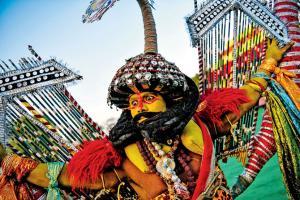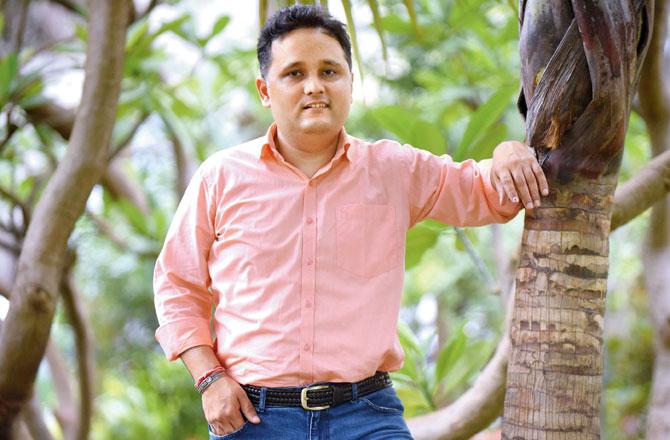Delving into Raavan during a period of personal emotional turmoil, helped author Amish channel his feelings into writing one of his darkest mythological novels and also understanding a much maligned man

An Indian artist performs traditional folk dance dressed as demon-king Ravana during a cultural event in New Delhi in March last year. Pic/Getty Images
Two years can be too short a time to make transitions. For 44-year-old Amish Tripathi, one of India's bestselling mythological writers, it was about moving from writing about his heroic, warrior queen Sita, to exploring the life of the man who kidnapped her, Raavan, and set the ball rolling for one of the most epic battles. Since then, a lot has happened. On the personal front, Amish admits — without divulging too much — that the last couple of years have been emotionally tough on him; telling the story of a vengeful character didn't make this any easy. The result is a book that Amish describes as one of his darkest mythological retellings yet.
Close on the heels of the release of Raavan: Enemy of Aryavarta (Westland), the third novel in his five-part Ram Chandra series, we caught up with the author at his Lower Parel office, where he pulled together resources from his learning to discuss why Raavan, the king of great knowledge and talent, became one of the most misunderstood characters in Indian mythology. Edited excerpts:
Also Read: The multiple truths of author Amish Tripathi
Raavan: Enemy of Aryavarta, your third book in the Ram Chandra series, is still two weeks away from release, but it's already the No.1 bestseller on Amazon. What does this kind of validation from your fans and readers mean to you?
That's a privilege. The book opened for pre-orders on June 4, and reached No. 1 almost immediately. But that's actually scary, because then I need to make sure that the book delivers. This is a nervous phase for me. When I am writing I don't think about anyone — I am just lost in the words and the universe. But, when the marketing phase starts, I begin worrying about whether the readers will like it [the book] or if the publisher will recover the money. I don't want anyone to make a loss on my account. So, please be gentle (laughs).

Amish Tripathi. Pic/Suresh Karkera
You've been churning one bestseller after another. Has it influenced what you bring to the table?
While writing, no. Traditionally, it is believed that if any upanyas or book doesn't have a philosophy within it, it's as sad as a body without a soul. There is no purpose to that book. I have said this repeatedly that it doesn't matter if readers agree or disagree with a philosophy, but the writer's thought should be there. The story is essentially a wrapper to convey what the writer believes in. And, I try my best to do that. The bestseller tag only means that the book will reach a larger audience.
Also Read: Amish Tripathi: I quit my job after writing the second book
Tell us about your new book. We know it is the story of Raavan, but is this Raavan very different from the one we know?
In modern, urban India, the impression of Raavan that exists is largely based on television serials — the first of which was in the 1980s. These serials had a very simplistic black and white approach. I am not deriding them, but they ended up portraying Raavan as a thug, villain or monster. That was not the way he was presented in the ancient, original Valmiki Ramayana or Adbhuta Ramayana, which offer a very nuanced take on him. They show his strength, qualities and weaknesses as well. For example, he was a devout worshipper of Lord Shiva, and had even written hymns to him that survive to this day. One of the greatest hymns that is sung on Maha Shivratri is called the Tandava Stotram, which was written by Raavan. The Rudra Veena, said to be the finest Indian string instruments ever made, is also believed to be invented by him. So, he is not just a violent man, but a talented and scholarly person. Yes, he had a massive ego and a bad temper, but all that makes him a very fascinating character.
Is that how you explain this character to us in the book?
More than explaining, I am exploring. In this particular book, I look at the life of Raavan from his birth to the time he kidnaps Sita. It's an exploration of his strengths, weaknesses, his high points and lows. The dominant feeling in the book is rage, because it is defined by his anger. It is a dark book, probably the darkest I have ever written.
Do you feel that Raavan has been a grossly misunderstood mythological figure?
I think, only in the recent past. Yes, Lord Ramayana has always been the hero. But why is it that despite so many people seeing Raavan as a person you should learn what not to do from, his hymns are still celebrated? The measure of the maturity of a society is to have contradictory thoughts, where there is something you can learn from everyone. From Raavan, we learn to control our ego, or we risk a sticky end. Our ancestors had that open-minded approach. We've lost that in the recent past.
In an earlier interview with us, you had spoken about the existence of multiple truths. Does that mean that a good and evil Raavan can co-exist?
There is a lovely Sanksrit line, which says that folk tales are often more powerful than the scriptures. That brings me to a famous North Indian folk tale, which revisits a scene, where Raavan lay dying after he was shot in the final battle. Here, Lord Ram tells Lakshman to show him [Raavan] respect, because though he was his opponent, he respected the knowledge he had. This shows the attitude of Lord Ram. So, one should not waste time judging, but learning. I have discussed an interesting philosophy in the book — that truly successful people are those, who actually have a monster inside them. The monster is what doesn't allow them to rest and puts fire in their belly. What differentiates the successful people from great people is whether the monster controls them or they control the monster. Because great people will use their capability for the good of others, but successful people will surrender to their monsters. And that's perhaps one way to look at Raavan.
You've been writing for nearly a decade now. How has your work changed since your first book?
I cannot comment on my writing, that's for the readers to decide. But this book is dark. It's also been a tough phase for me — the last two-and-a-half years — personally, for various issues. So, even I was emotionally not in a good place. I think all that went into my writing. Gautam Buddha said that suffering is a fundamental reality of life — some suffer more, some suffer less. Some people react to that suffering with nobility like Lord Ram, and some people react with rage — they hate the world. Raavan is like that. This hate and rage flows into the story, making it a very angry book.
Catch up on all the latest Mumbai news, crime news, current affairs, and also a complete guide on Mumbai from food to things to do and events across the city here. Also download the new mid-day Android and iOS apps to get latest updates
 Subscribe today by clicking the link and stay updated with the latest news!" Click here!
Subscribe today by clicking the link and stay updated with the latest news!" Click here!





